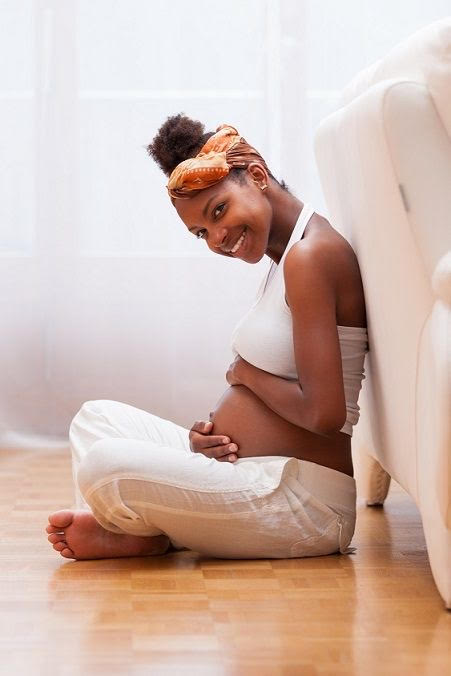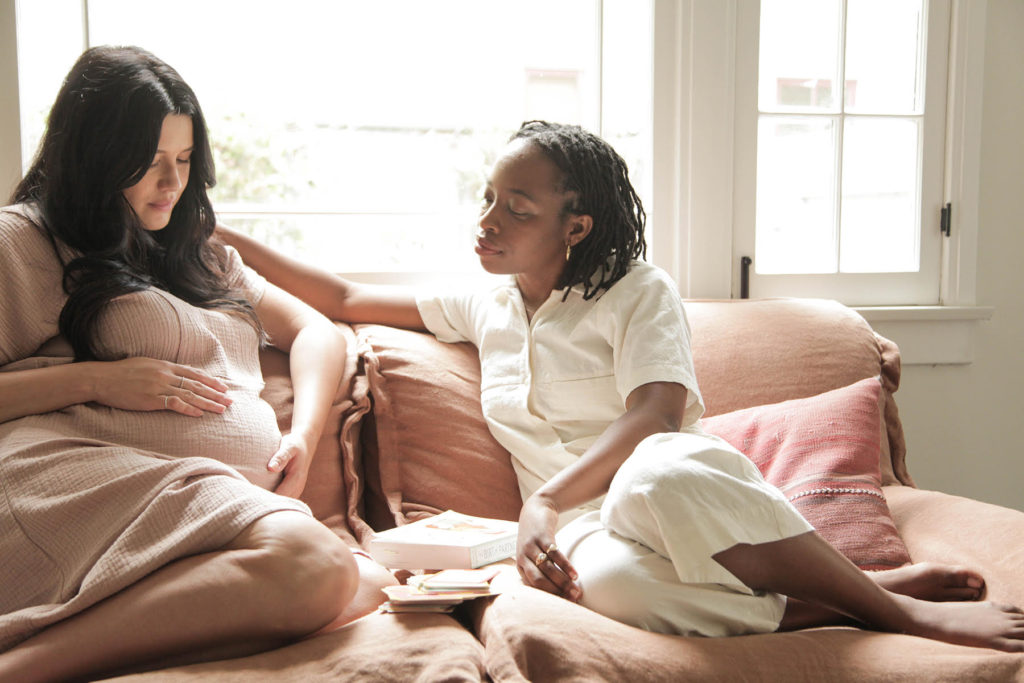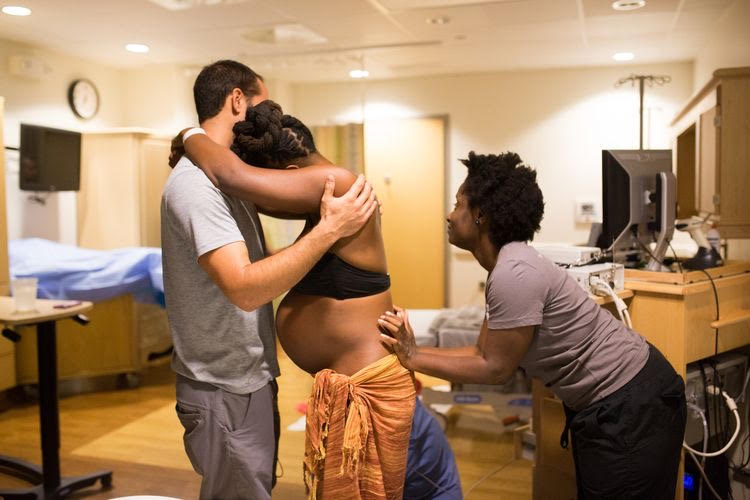
1. Describe yourself and what you do for work. What is a doula and how are they beneficial to the black community, especially? What are the steps you took to become a doula?
We are Kiah and Jess, and together make up Kuzaa Jade. A doula is a non-judgemental pregnancy support person who aids clients throughout their preconception, pregnancy, and postpartum periods. Doulas offer physical & emotional support as well as educate clients on their options and advocate for them in medical spaces. The black maternal statistics speak for themselves. Doulas are vital for black families and help to ensure they are informed of their options. We do our best to create the experience the birthing person desires by meeting with them, building relationships, and learning about their wants and needs. We ensure that their voices are heard. We took our training through Mama Glow, an organization based out of New York with Latham Thomas. It was really amazing being trained by a black woman and we learned so much in the class about the sacredness of birth.
2. What are prenatal and postpartum depression, what are your tips for women who are experiencing symptoms?
Prenatal depression is depression experienced during pregnancy. Some of the signs and symptoms closely mirror normal pregnancy symptoms, so prenatal depression can go undiagnosed in many cases. Postpartum depression is experienced after pregnancy and can have an effect on bonding with the newborn. For clients experiencing any signs of depression, we always recommend they see a medical professional who can assess their emotions. We encourage clients to use positive affirmations and be intentional about self care as they can aid in improving their mood as well.
3. How can pregnancy positively and negatively impact mental health?
As we go through our normal cycles it is normal to experience shifts in mood and feelings due to hormonal changes. This is even more so during pregnancy and postpartum. Pregnancy can be a stressful time if the birthing person has less access to resources or lacks a supportive tribe. As doulas, this is where we come in! We are there to notice symptoms and provide the resources to birthing people and their families that would be right for them.

4. When is it recommended to stop having sex during pregnancy?
In most cases sex throughout pregnancy is perfectly fine! Sex can actually be a great way to stay active and keep the romance alive within your relationship. It is always good to seek out advice from a doctor or midwife if you have concerns. While sex specifically won’t necessarily kick start a birthing person’s labor process, orgasms cause oxytocin to be released which is one of the hormones our bodies produce while in labor.
5. What is your advice for women who are experiencing or have experienced pregnancy complications (i.e. miscarriages or other health concerns)?
It is hard to give general advice for clients overall since everyone has a different story and circumstance, however, we would encourage everyone to honor their own journey and take the steps they need to individually process whatever they are going through. It can be physically, mentally, emotionally, and spiritually draining to experience infertility, loss, and other womb related health issues, but you don’t have to experience it alone. Erasing the stigma surrounding women’s health is a great first step for society to take when it comes to supporting women and healthy birthing spaces.
6. What advice do you have for women who are struggling with infertility?
Going through fertility treatments can be costly and stressful both mentally and physically for clients. It’s important for clients to consider their diet, nutrition, and overall health and wellness, as well as surround themselves with love and positivity. Through our womb wellness programs, we encourage individuals to nourish their relationships with their wombs by incorporating activities and soulwork into their journeys of bringing their baby earthside.
7. What should women expect post pregnancy (in regards to their mental health and wellness)?
The postpartum period is different for every person. It’s important to embrace your experience and not try to compare it to others. We work with clients to create a postpartum plan to ensure they are prepared and have the support they need while they heal. During pregnancy, your body is making lots of changes to adjust to the little human growing inside of you. It’s vital that you promote healing through proper diet, adequate sleep, and help from your tribe.

8. What type of food and exercises are recommended during pregnancy? How does a healthy lifestyle during pregnancy impact prenatal care and your mental health?
We eat for 4 main reasons: nutrition, energy, hormone regulation and mental health. It’s important to eat foods that are nutrient-dense and support those functions. We always recommend our clients to eat lots of fresh fruits and veggies! When shopping for fruits and veggies remember 1. Fresh 2. Frozen 3. Canned. Fresh foods definitely have the most nutritional value but frozen or canned are still good options as well. Eating a plant-based diet during and after pregnancy allows for mom* and baby to get the nutrients they need most.
During pregnancy, we recommend birthing people do activities like yoga and walking to stay active. There are various poses and stretches that are safe for pregnancy and do wonders if clients are experiencing discomfort. Walking and stretching can also aid in opening pelvic bones and assist in preparing the body for birth. Doing these activities with your partner can be great for bonding too!
9. What advice do you have for new moms that are combating exhaustion due to their babies fluctuating sleep schedule?
Adjusting to life with a newborn can be overwhelming and is definitely something we work to prepare clients for, during their prenatal care. We encourage clients to sleep when their babies are asleep and take the time they get to rest when they can. We emphasize the importance of creating a postpartum plan and encourage our clients’ village to create meal trains, etc. to help the new family adjust.
We would tell people supporting someone who recently gave birth to bring warm womb happy meals, offer to hold the new baby so mom can take a shower, change diapers, do laundry, wash dishes, or, ask how you can help!
10. When the mother experiences depression/ anxiety/ or trauma during pregnancy does the baby, in the womb, “feel it” or experience it as well?
YES! Baby feels and knows everything that happens in it’s external environment. Even before pregnancy, the womb serves as a holder of our feelings, emotions, and experiences. It’s important to incorporate womb wellness work into your self care routine during, after, and even when you’re not pregnant. Depending on whether you are currently pregnant or not, this can look like yoni steams, moon rituals, journaling, yoni mirror talks, and womb happy soaks.

11. What advice do you have for women who are struggling with having stretch marks, excess skin or weight, and other body image issues post pregnancy?
We emphasize loving your body where it is, because it has done so much to get you where you are now. It created, grew, and brought you your baby. It is completely normal to experience body changes because you have literally grown a human. We support our postpartum clients through self love rituals and do our best to make them feel empowered, beautiful, and strong.
*We recognize that all birthing people do not identify as mothers. Any gendered language was not intended to be non inclusive.
If you’re interested in learning more about our services, set up a free consultation! We will answer any questions you may have about how you or your loved ones can benefit from doula support. Are you a birthworker and want to connect? Join our Facebook group or send us an email today!